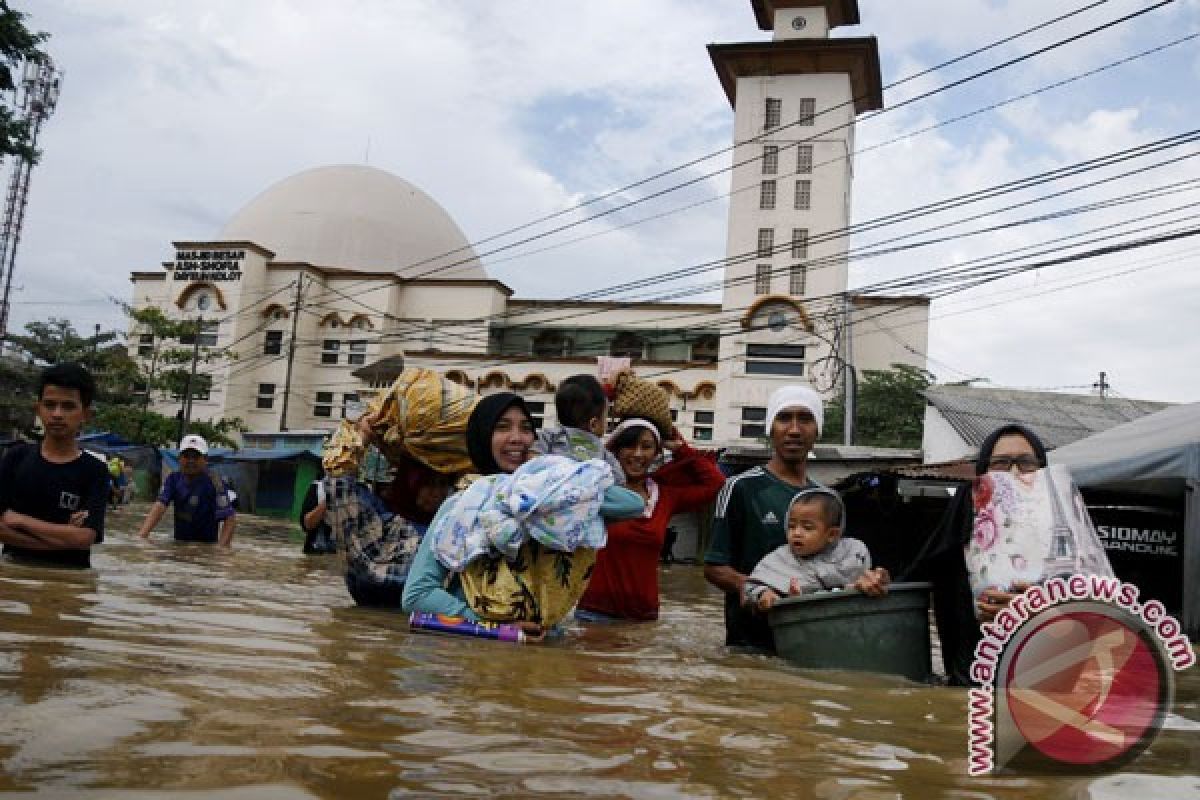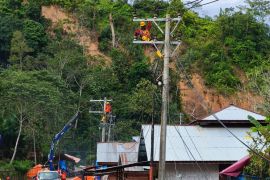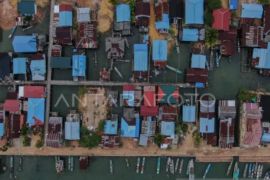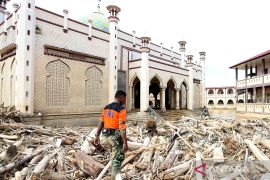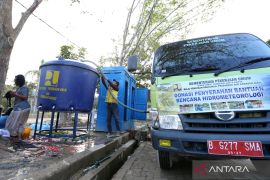The Bandung floods have left two dead and three missing, as the Citarum River overflowed following incessantly heavy rains, which began March 8.
The downpours caused flooding in 15 regions in Bandung District, Sutopo Purwo Nugroho, spokesman of the National Disaster Mitigation Agency (BNPB), said in a statement on March 13.
Social Affairs Minister Khofifah Indar Parawansa and West Java Governor Ahmad Heryawan visited flood victims on March 14. The minister inspected a public kitchen set up to feed the victims, to ensure that it had adequate supplies.
The flood-affected regions include Cicalengka, Rancaekek, Cileunyi, Solokan Jeruk, Majalaya, Ciparay, Baleendah, Dayeuhkolot, Bojongsoang, Pameungpeuk, Banjaran, Arjasri, Cangkuang, Katapang and Kutawaringin.
The flooding forced more than 8,000 people to evacuate to higher grounds, while submerging over 35,000 homes, and affected some 5,900 families, comprising 24,000 people.
The floodwaters reached a height of between 80 cm to three meters, particularly in villages near the river bank.
The dead victims included a 13-year-old teenager and a mother aged 40 years old, whose husband and two daughters were reported missing after being swept away by the flash flood.
The downpours also triggered a landslide that seriously damaged a house in the Lemburkebon area, Padasuka village, Kutawaringin Sub-district, Bandung.
Further, the major floods that ravaged Bandung have caused large losses to industries.
The current flooding was the worst to have occurred over the past few years and have caused larger losses than earlier floods, Chairman of the Indonesian Businessman Association (Apindo) of the West Java chapter Deddy Wijaya stated on March 15.
Several factories located in Dayeuhkolot and Banjaran were flooded and remain closed.
The flooding also prevented workers from reaching the factories, he noted.
Floods also submerged machinery and raw materials kept in factories.
"In view of the latest condition, material losses could reach billions of rupiah per day," he stated.
Additionally, flooding caused losses to shop owners and the banking business.
"This flooding is the worst over the past 10 years. The floodwaters have reached a height of up to 3.3 meters," Coordinator of Bandungs Disaster-Alert Youth said on the phone recently.
The office of Dayeuhkolot Sub-district administration, which has not been flooded in 20 years, was inundated to a height of 35 cm this year, he said.
BNPB Chief Willem Rampangilei supervised the evacuation of the natural disasters victims. They were housed in local government offices, schools and mosques.
Earlier, on March 2, The BNPB chief told the media that floods and landslides had struck 260 districts and municipalities in the country from January 1 to February 25, leaving 46 people dead and 16 others injured.
The natural disasters also forced the evacuation of 1,083.104 people, Willem Rampangilei said at the press conference.
The government has made efforts to minimize damage from floods and landslides by holding coordination meetings, familiarizing the public with potential natural disasters, developing contingency plans, strengthening logistics, declaring alert status, and providing relief aid, he said.
"When a flood happens, we must first focus on searching and rescuing victims, evacuating refugees and meeting their needs," he said.
To support emergency rescue operations, meet emergency needs and finance emergency repairs of damaged facilities, the government has set aside Rp3 billion in funds.
"The funds have been distributed among the districts of Aceh Utara, Solok Selatan, Solok, 50 Kota, Kampar, Rokan Hulu, Medan, Binjai, Merangin, Bungo, Indramayu, and the province of Bangka Belitung. Each of the regions received Rp250 million," Willem said.
In addition to Bandung, floods have recently struck three sub-districts in Sukabumi District, as well as in West Java, leaving a number of buildings damaged.
In Ketapang District, West Kalimantan Province, three sub-districts -Nanga Tayap, Sandai and Sungai Laur- were also inundated beginning March 10. The flooding is believed to be as bad as in 2010, has affected thousands of local inhabitants.
Floods also inundated thousands of houses in ten villages in Tangerang District of Banten Province on March 13.
The high intensity rain caused the local Cimanceuri River to overflow its banks and sent floods throughout the region, Head of Regional Disaster Mitigation Agency of Tangerang Teteng Jumara said.
In Sampang, Madura Island, East Java Province, floods submerged 12 villages, as the Kalikemuning River spilled over its bank last week.
"The present flooding is the worst," Head of the Sampang Disaster Mitigation Agency Wisno Hatono said recently.
Additionally, harvest failures were feared over 1,083 hectares of rice fields in Sampang.
Floods inundated 7,199 hectares of paddy fields in Riau and over 1,000 hectares in Jambi on Sumatra Island.
In the capital city, despite the Jakarta administration�s efforts to normalize sewage systems, floods reaching a height of up to 120 cm and inundated 20 neighborhoods in early February this year.
Following a recent finding of a large amount of cable jackets in waterways on Merdeka Selatan Road, Central Jakarta, Governor Basuki Tjahaja Purnama (Ahok) voiced his suspicion about sabotage.
Ahok suggested recently that it demonstrated an attempt by unknown persons to engineer floods and he reported the case to police, the Jakarta Post reported.
Jakarta Police Chief Insp. Gen. Tito Karnavian said the police had yet to conclude that the cable jackets were a form of sabotage.
On March 11, Tito announced that six scavengers were detained for allegedly stealing copper and tin inside the cables, believed to have belonged to the State Electricity Company (PLN) , and they left the cable jackets inside the sewers, Tempo.co reported.(*)
Reporter: Fardah
Editor: Heru Purwanto
Copyright © ANTARA 2016
